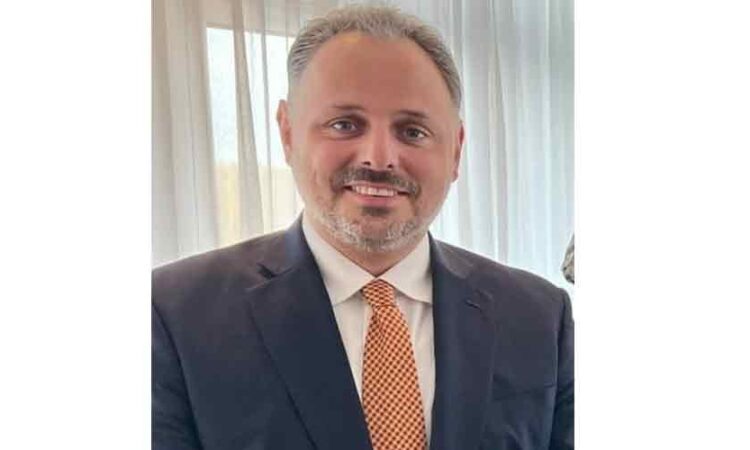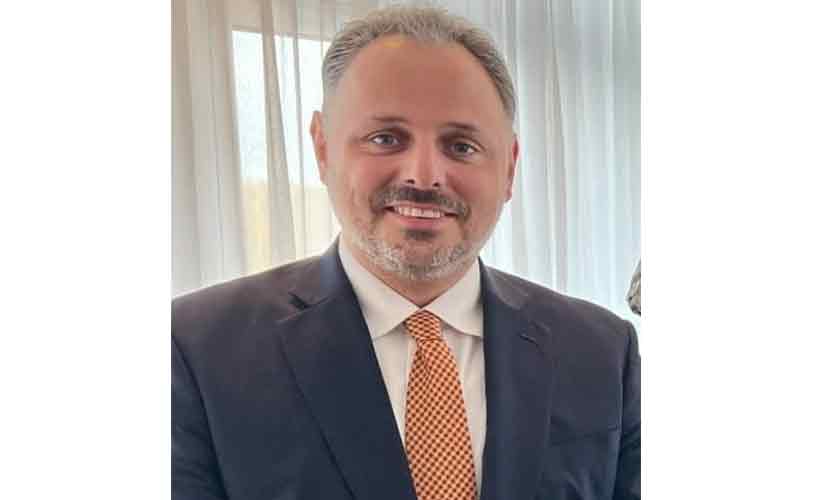
The News on Sunday spoke with Mirco Günther, the head of the Asia-Pacific Department at Friedrich-Ebert-Stiftung (FES). He has previously served as director of the Singapore-based FES Office for Regional Cooperation in Asia from 2019 to 2022 and led projects on geopolitics and geo-economics, the economy of tomorrow, and the future of work throughout the Asia-Pacific region. From 2016 to 2019, he was the director of the FES Afghanistan Office in Kabul and coordinator of the FES Asia Peace and Security Project.
Prior to joining the FES, Günther had held various leadership positions with the Organisation for Security and Co-operation in Europe (OSCE) from 2009 to 2016. Seconded by the German Foreign Office, he was deputy head of mission and chargé d’ affaires at the OSCE mission in Kazakhstan, deputy team leader with the OSCE monitoring mission in Eastern Ukraine, and political affairs officer at the OSCE mission in Tajikistan. He is a member of the civilian expert pool of the German Centre for International Peace Operations (ZIF).
Mirco Günther was a McCloy Fellow at Harvard University and chair of the German-American Conference at Harvard. He holds an MPA from the John F Kennedy School of Government and an MLitt in Middle East and Central Asian Security Studies from the University of St Andrews. He also completed a BA in Political Science at the Freie Universität Berlin and the Moscow State Institute of International Relations (MGIMO).
He is a frequent commentator on national and international media on Asia-Pacific, Eastern European, security and diplomatic affairs. Mirco Günther is a member of the Social Democratic Party of Germany (SPD), Tönissteiner Kreis and an Atlantik-Brücke Young Leaders alumnus.
The News on Sunday (TNS): What is the scope of the FES in Asia? How many offices does it have in the region? Would you like to highlight some major achievements of the FES in Asia during your tenure?
Mirco Gunther (MG): The Friedrich-Ebert-Stiftung (FES) is Germany’s oldest political foundation, established in 1925 as a legacy of Friedrich Ebert, Germany’s first democratically elected president. We maintain a network of more than 100 offices around the globe, including 15 national and regional offices in the Asia-Pacific. With our 100th birthday just around the corner, the FES activities are dedicated to the ideas and values of social democracy. We work to promote social justice and focus on topics like political education and participation, gender justice, climate change, the future of work and the economy of tomorrow, geopolitics and international affairs. The FES Office in Pakistan was established in 1990. We work with our partners in the government and civil society to support dialogue between Pakistan and Germany, South Asia and Europe. I have only recently taken over the helmet of the FES Asia-Pacific Department and am very excited to be in Pakistan to meet with partners and friends.
TNS: How has the war in Ukraine impacted Germany and Asia?
MG: Russia’s invasion of Ukraine has upended the European security order. We are in the midst of a major reordering of our world. Germany has put in motion a paradigm shift in its foreign, security, economic and energy policies – a historic turning point referred to as Zeitenwende in the German and European political discourse. This includes a 100-billion-euro special fund to close critical gaps in military capabilities, more and faster investments in renewable energy, diversifying energy imports in order to end Germany’s dependence on Russian fossil fuels and massive relief packages to counter soaring energy, electricity and food prices, particularly for the most vulnerable groups in our society. The global repercussions of the war are profound and acutely felt in countries throughout Asia, including Pakistan. We all share the same concerns on commodity shortages, a worsening hunger crisis, as well as uncertainties around energy costs and imports.
TNS: Keeping aside traditional politico-economic relations with China and India, do you think Germany is expanding its outreach in Asia?
MG: The German government is making major efforts to reach out to old and new partners beyond the Western alliance. Asia, as the world’s centre of gravity, will play a crucial part in shaping the future of international order, security, trade and the global economy. Germany and the European Union have put forward Indo-Pacific strategies that stress the need to diversify partnerships. Their approach is broad-based and comprehensively covers a wide range of areas, including climate change, health, digitalisation, economic cooperation, connectivity, security and defence, as well as research and innovation. We recognise Pakistan’s key role in security and stability in South Asia and beyond and understand that Pakistan is an important pillar of Germany’s expanded outreach across the region.
TNS: As head of FES Asia, what role do you see Germany playing in the wake of a changing global order, especially in terms of the Indo-Pacific region?
MG: We all need to do a much better job of listening and putting ourselves into the shoes of our partners. The mixed global reactions to Russia’s war of aggression against Ukraine show that we need a more strategic dialogue in order to better understand each other’s interests, grievances and priorities. Germany can play a critical role in this dialogue as a facilitating and moderating voice.
This also means that we have to recognise the complexity of the issues at hand. The binary discourse of “democracies vs autocracies”, to take one example, is not helpful in this regard and is shared by only a few. While it is of paramount importance that we strengthen our democratic resilience, the realities across the Asia-Pacific region are more complicated. Geopolitically, highly industrialised nations such as Japan, Australia, New Zealand, South Korea and Singapore have joined the Western sanctions against Russia to varying degrees. But Asia’s developing and emerging countries, in particular, have gone to great lengths to avoid taking sides in the conflict between Russia and the West and between China and the United States. Keenly aware of the multiple challenges to their own development paths, they need to manoeuvre carefully between the poles. At the same time, countries in the Asia-Pacific region have a vital interest in upholding the rules-based international order. They are opposed to a world order with exclusive zones of influence and reject the notions of unipolarity or bipolarity. This is a view we all share and a solid building block for taking partnerships forward.
TNS: In view of the recent bilateral meetings between the foreign ministers of Pakistan and Germany in Islamabad and Berlin, how do you see the bilateral relationship between the two countries?
MG: Pakistan and Germany enjoy a long-standing relationship. Last year, they marked the 70th anniversary of their bilateral relations. Germany is the largest trading partner of Pakistan in the European Union. Pakistan’s main exports to Germany are textiles, leather goods, sport and footwear, as well as medical equipment. With a view to Pakistan’s important role in global textile production, the FES has worked for many years to promote core labour and sustainability standards in the context of the Generalised Scheme of Preferences Plus (GSP+) between Pakistan and the European Union.
Pakistan plays a crucial role in regional and global security: as a nuclear power, a major contributor to UN peace missions and, very importantly, as a key partner for Germany on Afghanistan, especially this year, with Germany’s presidency of the G7 and Pakistan’s chairmanship of the G77. A peaceful and prosperous Afghanistan that contributes to stability and connectivity is in everyone’s interest. We are all gravely concerned about the alarming humanitarian and human rights situation in Afghanistan. Pakistan has felt the immediate impact of decades of war in and around Afghanistan more than any other country. It carries a significant humanitarian burden and needs the international community’s continued support.
While the focus in Europe will be on the devastating situation in Ukraine and Russia’s aggression for the immediate future, we must not lose sight of challenges elsewhere. Security in Europe and in the Indo-Pacific are deeply interlinked. And even though we all need to prioritise and match ends with finite means, Afghanistan requires our attention. Last year’s tragic events, the hasty withdrawal of the international coalition and the Taliban takeover, have created a security dilemma and vacuum that South and Central Asian countries feel the most.
TNS: What can be potential areas of cooperation between Germany and Pakistan given the former’s technological and industrial prowess vis-à-vis the massive untapped human and material resource potential in the latter?
MG: The bilateral areas of cooperation are multifaceted and include trade, investment, climate change, people-to-people contacts, security and development cooperation; the latter with an emphasis on renewable energies, vocational training, good governance and health care. Pakistan and Germany’s climate partnership will become even more important in the future in light of this year’s devastating floods. We were all shocked to watch an area roughly the size of Germany be fully covered by water and deeply saddened about the loss of lives and livelihoods. The German government continues to provide rapid humanitarian assistance and is working with Pakistan to expand cooperation in climate protection, disaster management and access to international climate financing.
Germany’s technological and industrial prowess could perhaps also be helpful in the upcoming recovery effort when it comes to rebuilding infrastructure and investing in green technology. Germany and Europe will need to step up their engagement on connectivity across the region, for instance, through the EU’s Global Gateway and bilateral initiatives, not least with a view to the wider geopolitical dynamics. If European capitals do not step in and put forward credible and meaningful offers, others will continue to fill that gap. A geopolitical Europe needs a stronger footprint in Pakistan and South Asia.
The writer is an anchor and correspondent at PTV World and takes a keen interest in national security, international security affairs and human rights. She can be reached via Twitter: @TayyabaNKhan







